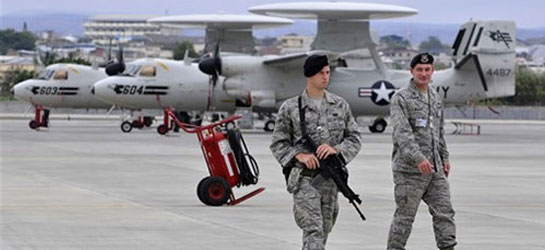
U.S. State Department spokesman Philip Crowley said Wednesday that Washington hopes Bogota “takes the necessary steps to preserve the bilateral military agreement,” and that in the meantime cooperation will continue under pre-existing agreements.
Colombia’s Constitutional Court on Tuesday suspended the deal, ruling that it is unconstitutional until ratified by Congress.
“We will consult with the Colombian government, we understand the issues that this legal matter involves and we hope that the Santos government takes appropriate measures to guarantee that we can maintain our bilateral relationship,” Crowley continued.
“Executive or legislative actions may exist that could overcome doubts” expressed by the court, and “these are the types of questions that we are asking the Colombian government in order to understand what they plan to do,” Crowley said.
In the meantime “our close cooperation with Colombia will continue under previously existing agreements,” State Department spokesman Charles Luoma–Overstreet told AFP.
Colombian President Juan Manuel Santos backed a statement made by his Defense Minister Rodrigo Rivera earlier Wednesday, saying that his government will abide by the court’s ruling.
Santos said his government will study the agreement and will “decide if it is worth continuing with the pact or not.”
Former commander of the Colombian armed forces General Freddy Padilla claimed Wednesday that by law, if the pact is to be ratified by the Andean nation’s Congress, then it must also be ratified by U.S. Congress. Padilla said that U.S. Congress wouldn’t ratify the pact “due to their foreign policy circumstances.”
According to Constitutional Court President Mauricio Gonzalez Cuervo, details such as “access points and the use of air bases, free movement within these installations, the freedom to carry arms, among other things” led the court to decide that the agreement was not simply an extension of previous treaties.
The controversial pact, which granted the U.S. access to at least seven Colombian military bases and civilian airports, was signed by U.S. President Barack Obama and former Colombian President Alvaro Uribe in August 2009, but was never approved by the country’s Congress. According to Uribe, the pact was a continuation of existing policy and did not need congressional approval.
The agreement caused tensions in the region, as neighbors Ecuador and Venezuela consider U.S. military presence in Colombia a threat to their sovereignty.
The pact was also controversial within Colombia, with leftist opposition party Polo Democratico labelling the pact a violation of Colombian independence and sovereignty.

